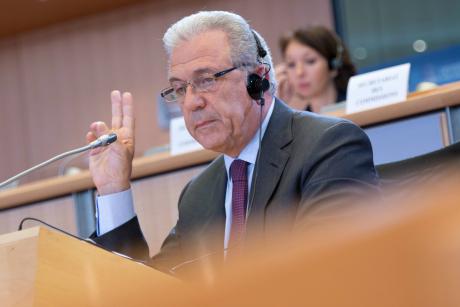The best way to combat illegal migration is to set up a regular immigration framework and not a “Fortress Europe”, according to Dimitris Avramopoulos, the Greek commissioner-designate for migration and home affairs. EurActiv Greece reports.
The former Greek defence minister appeared before the Parliament’s Civil Liberties and Home Affairs Committee (LIBE) on Tuesday (30 September).
Avramopoulos surprised socialist and left-wing MEPs in the audience by toning down his conservative rhetoric, mentioning many times that the protection of fundamental and human rights was a top priority.
The former mayor of Athens made clear that he was against “Fortress Europe”, while insisting that the EU’s external borders must be policed effectively.
“The answer [to the current challenges] is definitely not Fortress Europe,” he told MEPs. “History has proven that fortresses built for the protection from external threats ended up enslaving those they were built to protect”.
The declarations by the Greek Commissioner-designate appeared to placate MEPs who were initially sceptical of Avramamopoulos’s appointment.
Tanja Fajon, from the Socialist and Democrats (S&D) group in Parliament, said, “I welcome the commissioner-designate’s clear and loud position against Fortress Europe. Socialists and Democrats insist that building high walls around Europe or national states leads to very dangerous isolation,” she said after the hearing.
Regular immigration
The Greek commissioner-designate claimed that a legal immigration framework was needed and that EU citizens should not “fear” such a move.
Referring to the mission letter he received from Commission President-elect Jean-Claude Juncker, Avramopoulos said one of his main tasks would be to address the shortcomings of the “Blue Card” Directive.
“The best way to combat illegal migration is creating a regular immigration framework”, he said, adding that such a policy would also help Europe address skills shortages and attract the talents it needs.
Pressure over Dublin II
Avramopoulos was repeatedly asked about the Dublin II Regulation for asylum applications and spoke in favour of reviewing “specific aspects” of it.
According to the rule, only one EU country is responsible for examining an asylum application in order to avoid asylum seekers being sent from one country to another.
But southern EU countries, including Italy, Spain and Greece, have complained that the law does not mean an equal burden-sharing as the vast majority of asylum seekers land on southern shores. They are looking for “more solidarity” from the rest of Europe.
Green MEP Ska Keller, who recently told in an interview that the Dublin II Regulation was “unfair”, asked Avramopoulos about his intentions.
“Each country has its own needs […] and each country will determine how many [asylum seekers] it will absorb,” Avramopoulos replied, ruling out a full review of the regulation which has only “just been revised”.
Nevertheless he added that serious and careful studies should be conducted for a better burden-sharing while changing the terms of resettlement.
“I am determined to encourage member states to host more refugees from third countries. Resettlement of refugees is one of the most visible acts of generosity and solidarity toward third countries hosting large numbers of refugees,” he noted.
Reinforcing Frontex
On illegal immigration, the Greek Commissioner-designate said he will seek to expand the responsibilities of the European border agency Frontex, inviting policymakers at European and national level to create a “true European border system”.
“Frontex should be turned into a body that will save lives but simultaneously protect the borders,” Avramopoulos stressed.
He also asked the support of MEPs to promote the establishment of European Border Guard Teams to assist national authorities in policing the EU’s external borders.
“Schengen is one of the greatest achievements of European integration,” Avramopoulos said. “External borders must be policed effectively without creating a ‘Fortress Europe’,” he repeated.
He backed the integration of Romania and Bulgaria into the Schengen common border scheme, declaring, “I undertake the commitment that soon these countries will become a part of the Schengen area.”
Avramopoulos also backed the idea of allowing people to apply for asylum in EU delegations outside of Europe.
“In third countries where we have EU delegations, we should have an adviser on migration and asylum that could examine asylum requests on the spot,” he said, adding that he first needs to consult with his “boss” Federica Mogherini, the EU foreign policy chief.
Fight against terrorism
Avramopoulos was asked about the pan-European information sharing system of airline passengers to help combat terrorism.
The EU directive imposing data retention obligations on electronic communications services is no longer valid, according to a recent landmark ruling of the European Court of Justice.
Avramopoulos defended the court’s decision and highlighted the need to hasten the adoption of the EU’s data privacy regulation.
He noted that EU’s role is to help countries combat terrorist threats and especially the returning “foreign fighters” but made clear that any initiative related to sharing airline passenger rights should ensure the protection of fundamental rights.





